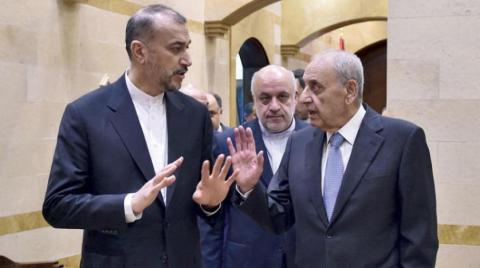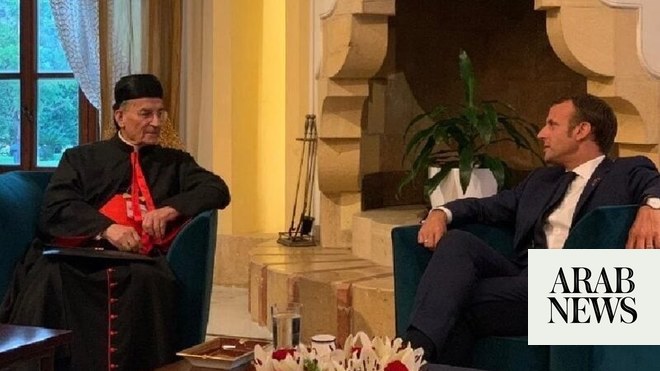
Some political circles are discussing the possibility of Gebran Bassil — President Michel Aoun’s son-in-law and head of the Free Patriotic Movement — becoming the next Lebanese president
Others believe either that Lebanese Forces leader Samir Geagea or Lebanese Army Commander Gen. Joseph Aoun could be the next president
BEIRUT: Lebanese political parties are setting demands over the election of a new Lebanese president ahead of an urgent constitutional deadline later this year.
According to the country’s Constitution, Parliament must meet on the 10th day preceding the expiration of the president’s term (Oct. 31) to elect a new president, in the event that the parliament speaker fails to hold a session before that date.
Some political circles are discussing the possibility of MP Gebran Bassil — President Michel Aoun’s son-in-law and head of the Free Patriotic Movement — becoming the next Lebanese president.
Others believe either that Lebanese Forces leader Samir Geagea or Lebanese Army Commander Gen. Joseph Aoun could be the next president. Some have proposed electing independent Maronite figures unaffiliated with conflicting parties, focusing on the importance of having a president who steers clear of internal, regional and international disputes.
Lebanon had previously fallen into a presidential vacuum for more than two years after the end of former president Michel Suleiman’s term. Aoun, a Hezbollah ally, only reached office after reaching a settlement with the head of the Future Movement, Saad Hariri. But Hariri later regretted his involvement after Aoun and his political team turned their back on him.
On Wednesday, the two largest Christian parties in the country put forward their demands for the next president, portending a difficult electoral battle ahead.
The FPM issued a statement, stressing the need to hold presidential elections on time per the Constitution and in a manner that respects the national political will expressed by the Lebanese public in the recent parliamentary elections.
“The next president should accelerate the adoption of reform laws in Parliament to sign the final agreement with the IMF and other reform laws, such as restoring funds transferred abroad by completely lifting the bank secrecy of public officials, reexamining the public sector and rationalizing it, developing public employee competencies, activatating the supervisory bodies to curb corruption, developing a plan to implement automation, putting e-government into practice, restructuring the Banque du Liban and rebuilding the banking sector,” the FPM statement read.
On the other hand, LF leader Geagea said in a press conference that he would reject a “moderate consensual president.” He added: “We oppose with all our might electing a president from the March 8 forces.” The March 8 alliance includes Hezbollah and its allies.
Following a meeting between the LF parliamentary bloc and the party’s central council, Geagea said: “The main factors that have brought upon us the current crisis are the confiscation of the state’s strategic decision, mismanagement and corruption.”
He added: “The main actor behind this crisis is Hezbollah, which confiscated Lebanon’s strategic decision. It is also directly responsible for mismanagement through smuggling, for example, and through its alliance with the corrupt in the country to cover its actions and its illegal position.”
Geagea said: “The presidential election should be the first step on the path to salvation. Otherwise, we will be facing the worst.”
He added that the opposition must agree on a candidate who can achieve sovereignty and reforms.
“If the next president is affiliated to the axis of resistance, we will face strong Arab isolation. This axis has never been an axis of development and reconstruction.”
Geagea said: “How can we agree on a consensual president when we are completely different; one sovereign party and one nonsovereign party? We reject a consensual or centrist president. Rather, a president must be elected to solve the crisis. Governments of national unity have only reached national unity in poverty and humiliation. We cannot thus adopt the same logic for the presidency.”
He called on opposition MPs to further discuss the issue and form a committee to agree on one candidate.
Geagea said that he is a “natural candidate for the presidency,” but that his bid would only be valid if opposition MPs agree to run a single candidate of their own.
Meanwhile, as Lebanon commemorates on Thursday the second anniversary of the Aug. 4 Beirut port explosion, the World Bank issued a report saying: “Lebanon must critically adopt and efficiently implement a comprehensive program of macroeconomic, financial and sector reforms that prioritize governance, accountability and inclusiveness. The earlier these reforms will be initiated, the less painful the cost of recovery will be on the Lebanese people.”
The report added: “Public finance in post-civil war Lebanon has been an instrument for systematic capture of the country’s resources, as it served the interests of an entrenched political economy. Excessive debt accumulation was used to give the illusion of stability and reinforce confidence in the macrofinancial system for deposits to continue to flow in. Lebanon’s depression — deliberate in the making over the past 30 years — has hollowed out the state of the provision of basic services to its citizens.”












